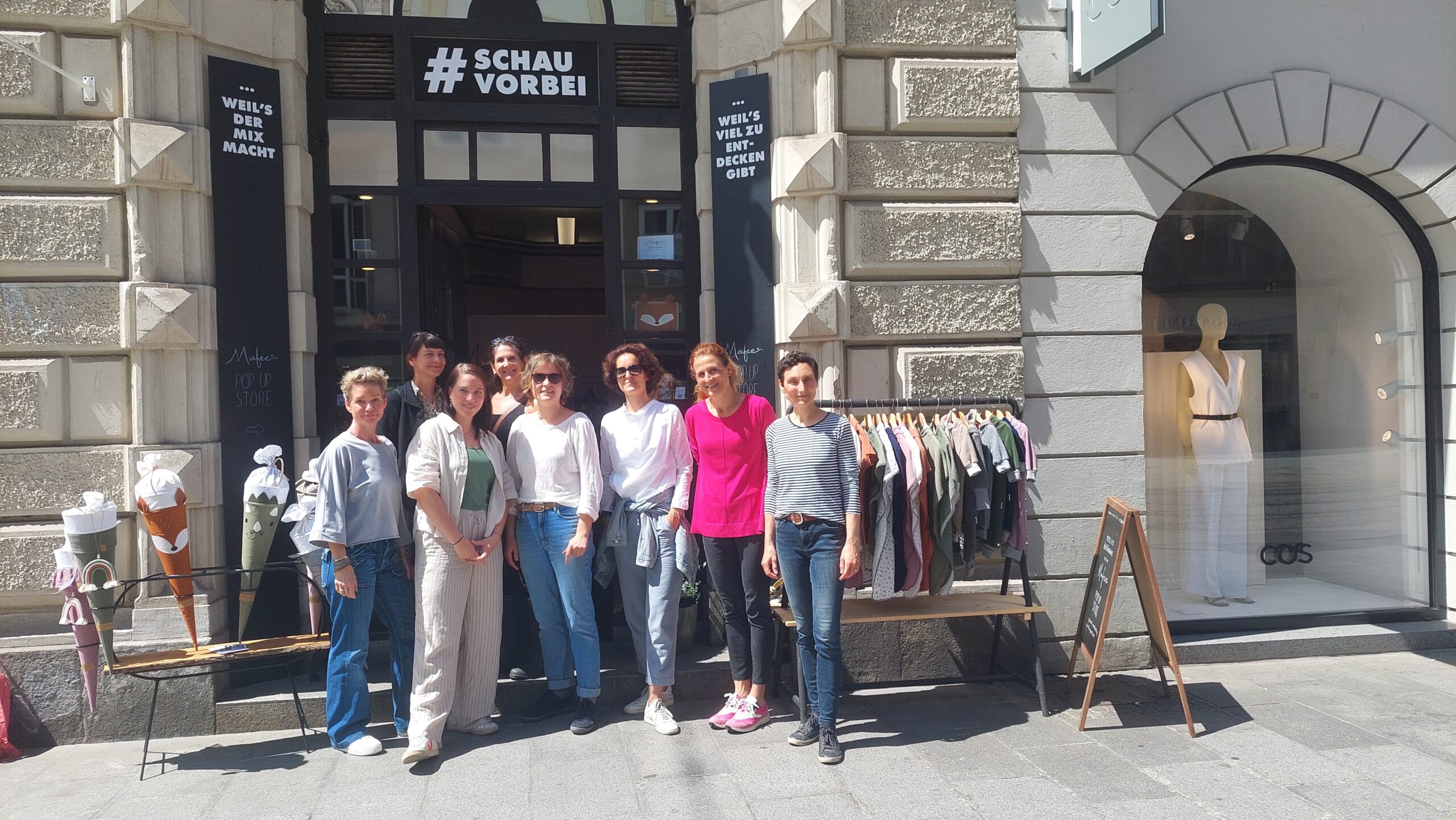The Pilot Idea
From 1 June to 30 September, the space at Herrengasse 10 will be home to a colourful collection of various regional, sustainable products. The free shop space belongs to the city of Graz and will be made available to the ‘NiCE’ project for 4 months. Together with the Department for Economic and Tourism Development StadtLABOR supports the entrepreneurs throughout the summer.
The aim of the temporary use oft he space are
- to improve the Visibility of sustainable and local companies and their products
- revitalisation of vacant spaces in the city centre
- Raise awareness of sustainable business models
- Offering a selection of sustainable local products
During June and September Herrengasse 10 will be open on Monday to Saturday from 10am – 6pm. In July and August on Wednesday to Saturday from 10am – 6pm.
How it started
At the end of April 2024 this central space in the city of Graz became available and the city of Graz was looking for potential pop-up users. An online meeting was quickly organised with participants of the NiCE networking meetings and a coreteam for the project was quickly formed.
For the months of June and September, a programme around reuse an upcycle-oriented was found. For the months of July and August, the focus was on the creative industries.
Colourful programme and changing exhibitors
June was all about the circular economy. A group of five entrepreneurs who are upcycling textiles and furniture moved into the small space in the city centre. The entrepreneurs divided up the opening hours and sold their own as well as each other’s products. This meant that small businesses could also take advantage of the offer.
The first week at Herrengasse 10 was opened by ‘Mafee’. Mafee produces childrens fashion directly in Graz. Their fabrics are all organic and they take a special approach: Various fashion pieces and accessories are designed to reduce waste. For example, size-adjustable children’s birthdaycrowns and backpacks are sewn, that ‘grow’ with the child for several years. This means that the products can be used for a longer period of time and do not end up in the used clothing containers as quickly as conventional items do.
The following women also worked with textiles:
Felizia alias ‘Waldlaeufer.in’, who upcycles jeans. Felizia is a denim artist and repairs jeans according to an old Japanese art of embroidery.
The next in the group is Verena from ‘fundikat’. She conjures up all sorts of textiles from vintace fabric. She produces cosmetic bags, passport covers and wallets.
Andrea from „Cerwenka“ is dedicated to the so-called „Froschgoscherl“. These items decorate traditional Austrian costumes in particular with upcycled leather. She also produces hair accessories and bracelets – her trademark: ‘Froschgoscherl’ probably best translated into English as “Frogmouth”.
The group was enriched by Rike. Rike works outside the city at „vomHügel“. There you can buy local organic flowers and restored furniture. She gives old, used furniture a second chance.
This group will move in once again in September and the topic of ‘circular economy’ will be brought back into the spotlight with an ‘upcycling festival’.
July and August are dedicated to the creative industries.
Herrengasse 10 will be hosted by LebensGroß throughout July and August. LebensGroß supports people with disabilities in their everyday lives and also has several workshops where various products are manufactured. These products are sold at Herrengasse 10. Felt pendants, ceramic cups, soaps and tea towels are just a small part of the product range.
In addition, there is an area of Herrengasse 10 that is available to young entrepreneurs. They can share the space on a daily basis with LebensGroß. Ten other female entrepreneurs also take of this opportunity to showcase their products. The group includes a jewellery designer, seamstresses, various artists offering watercolour paintings and artistic stained glass and regional cosmetics manufacturers.
Learnings and next steps
The interim use of Herrengasse 10 will be completed by the end of September. At the same time, the StadtLABOR is working on a larger ‘House of the Future’. Thanks to the new contacts and the successful realisation of the small pilot project, new cooperation partners have been attracted and together they are working on a larger vision.
Lessons learned in relation to the cooperation between several individual companies and a large organisation, as well as with the City of Graz, are continuously reflected upon and will be useful for the establishment of an umbrella organisation for the ‘House of the Future’.
Herrengasse 10 shows how important living labs are for everyone
Through this practical implementation, not only entrepreneurs were able to try things out, but consumers and tourists in the city centre also benefited from the mix of sectors.
Citizens of Graz were delighted with the useful and creative interim use of Herrengasse 10 and would like to see more projects like this.
Tourists bought Graz souvenirs from the regional entrepreneurs in Herrengasse 10 and the sewing group was able to share their ideas about upcycling and gain new customers.
Being able to make these projects more visible through this pilot has been great so far. Providing the public with information on the project via regional media outlets a well as social media has resulted in attracting many curious people into the city centre.
Link: Programme Herrengasse
